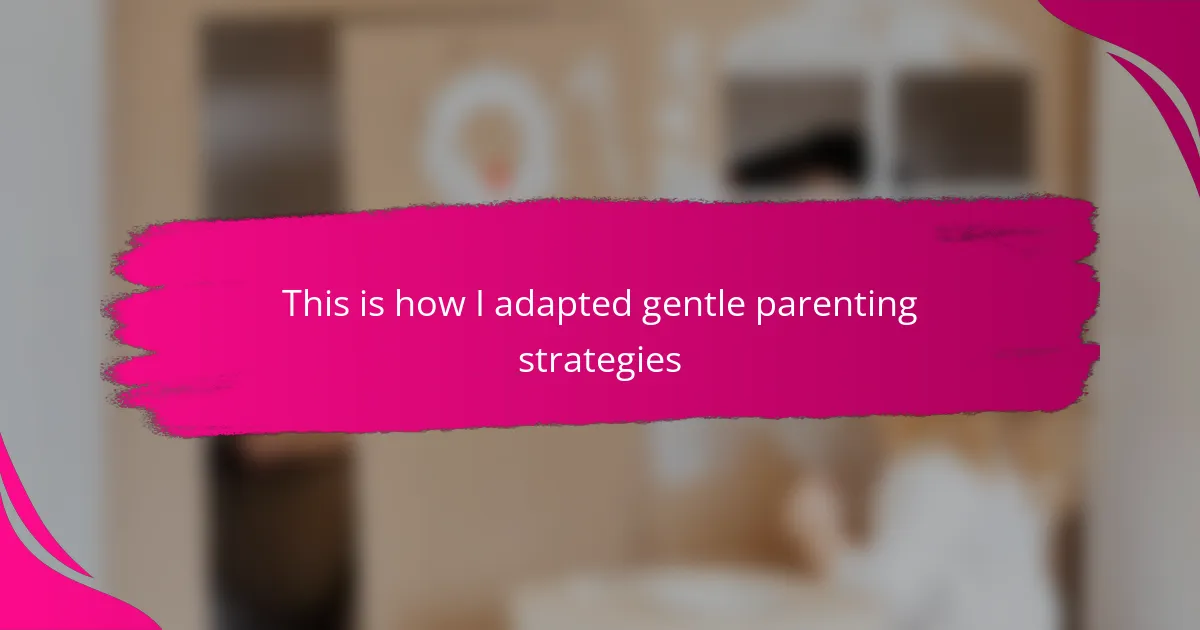Key takeaways
- Gentle parenting emphasizes respect and empathy, fostering a deeper connection between parent and child.
- Active listening and offering choices within boundaries help reduce power struggles and promote emotional intelligence.
- Setting boundaries with compassion transforms discipline from punishment to guidance, enhancing trust and understanding.
- Flexibility and adapting strategies to each child’s unique needs are crucial for effectively practicing gentle parenting.
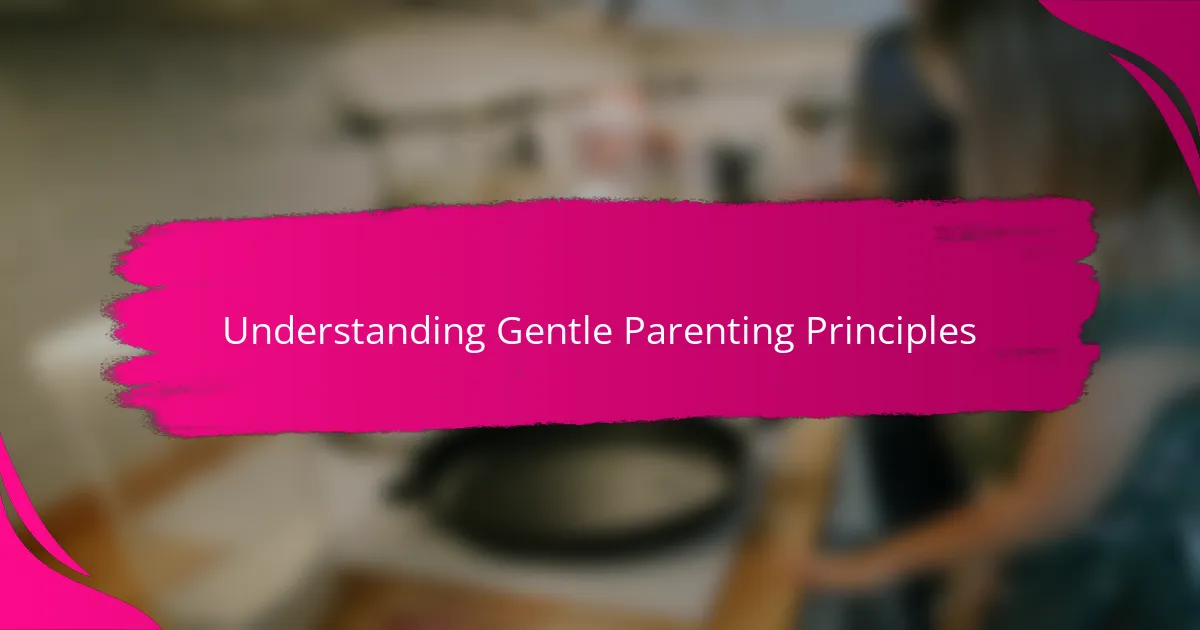
Understanding Gentle Parenting Principles
Understanding gentle parenting starts with recognizing that it’s rooted in respect and empathy. I’ve found that seeing my child as a whole person with feelings deserving of validation completely shifted how I responded to their tantrums and frustrations. Have you ever paused to wonder what your child might be feeling beneath their behavior?
Gentle parenting isn’t about letting kids do whatever they want; it’s about guiding with patience and kindness. When I began practicing this, I realized it took more emotional energy but also created a deeper connection and trust between us. This approach meant saying no without anger and setting boundaries while still honoring my child’s emotions—a balancing act I’m still learning every day.
At its core, gentle parenting challenges the traditional idea that discipline means punishment. I used to think being firm meant being strict, but now I see it as being firm with love. This principle helped me replace fear-based reactions with intentional, compassionate choices, paving the way for healthier communication and growth.
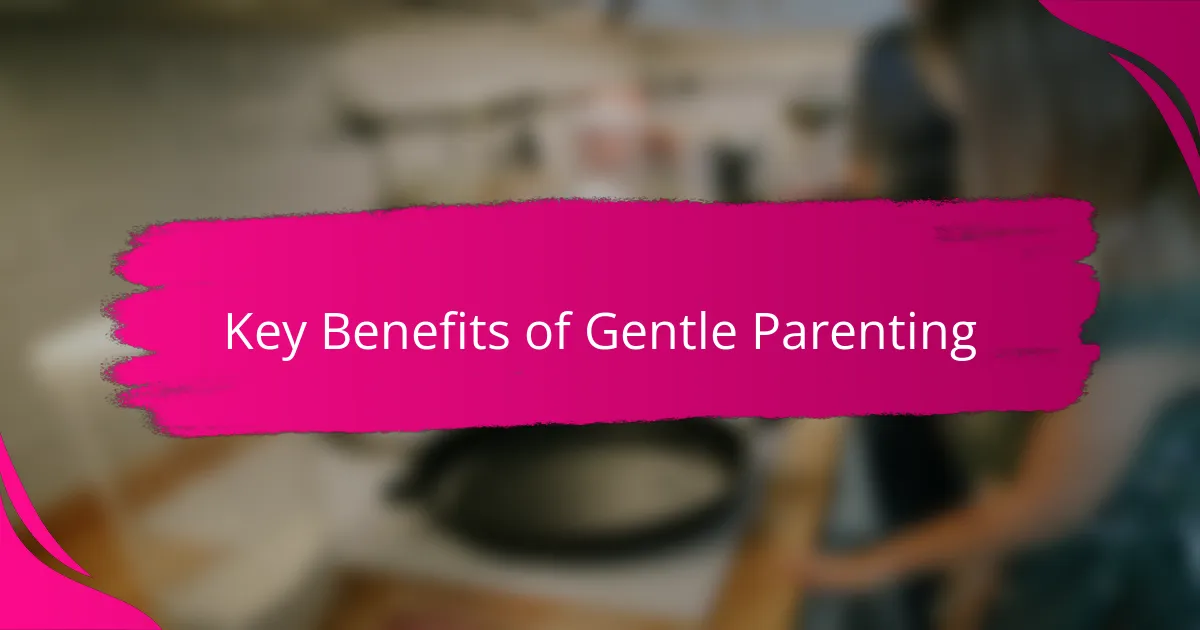
Key Benefits of Gentle Parenting
One of the biggest benefits I noticed with gentle parenting is how it transforms the parent-child relationship. Instead of feeling like an authority figure enforcing rules, I became more of a partner in my child’s emotional journey. It made me wonder—how often do we actually take the time to truly listen to our kids? When I did, their openness and trust grew in ways I hadn’t expected.
I also found my stress levels lowered significantly. When you approach tough moments with empathy rather than frustration, the whole atmosphere changes. It’s like replacing a noisy storm with calm waves. This shift didn’t happen overnight, but the sense of peace it created for both me and my child makes the effort worthwhile.
Gentle parenting also helped me foster my child’s emotional intelligence. By validating feelings instead of dismissing them, I watched my child become more aware and articulate about what they were experiencing. I often ask myself, how can I teach empathy if I’m not practicing it myself? This approach not only nurtured kindness in my child but in me as well.
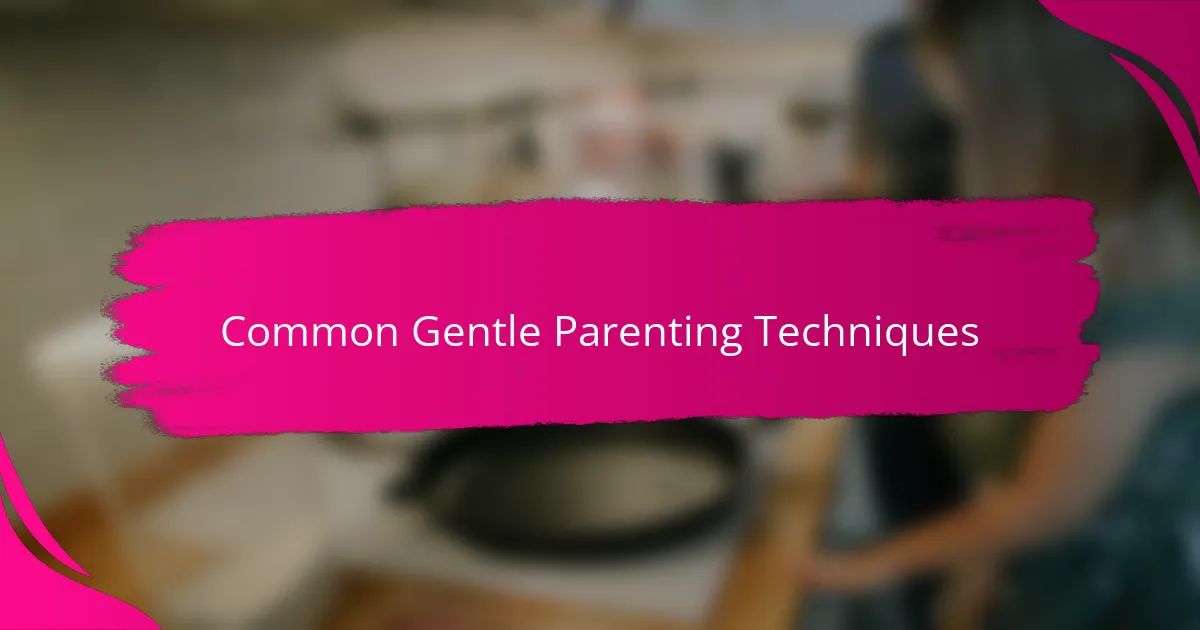
Common Gentle Parenting Techniques
One gentle parenting technique that truly resonated with me is active listening. When my child is upset, instead of jumping in with immediate solutions or corrections, I focus on hearing what they’re really saying. Have you ever noticed how just feeling heard can sometimes calm a storm? This approach invites more honest communication and helps me connect with my child’s inner world.
Another method I embraced is offering choices within boundaries. I learned that giving my child a sense of control—even in small ways—reduces power struggles dramatically. For example, letting them pick between two healthy snacks makes them feel respected and part of the decision-making, which is empowering for both of us.
I also rely on gentle redirection rather than punishment. When my toddler reached for something dangerous, I didn’t just say “no,” but guided their attention toward a safe and fun alternative. This not only kept them safe but maintained our positive relationship, which felt like a win-win. Have you tried replacing “don’t” with “let’s try this” and noticed the difference it makes?
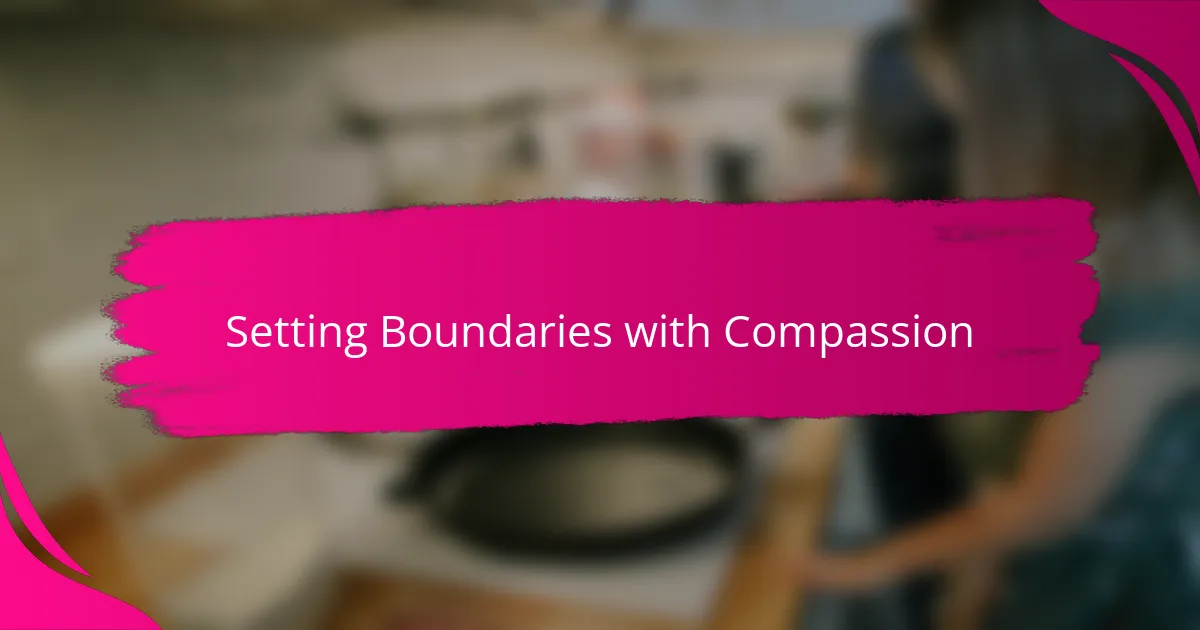
Setting Boundaries with Compassion
Setting boundaries with compassion felt like walking a tightrope at first. I wanted my child to understand limits without feeling shut down or unloved. It took me some time to realize that firmness and kindness aren’t opposites—they actually strengthen each other.
One moment that sticks with me is when I had to say no to a playground invitation because it was getting late. Instead of a flat, “No, we’re going home,” I explained why and acknowledged their disappointment. That simple act of validating their feelings while holding the boundary made the difference—I could see trust grow even in the midst of a refusal.
Have you ever noticed how children test limits not to defy us, but to understand the world? When I reminded myself of this, I started setting boundaries from a place of caring rather than control. This shift transformed everyday challenges into opportunities for teaching empathy and respect.
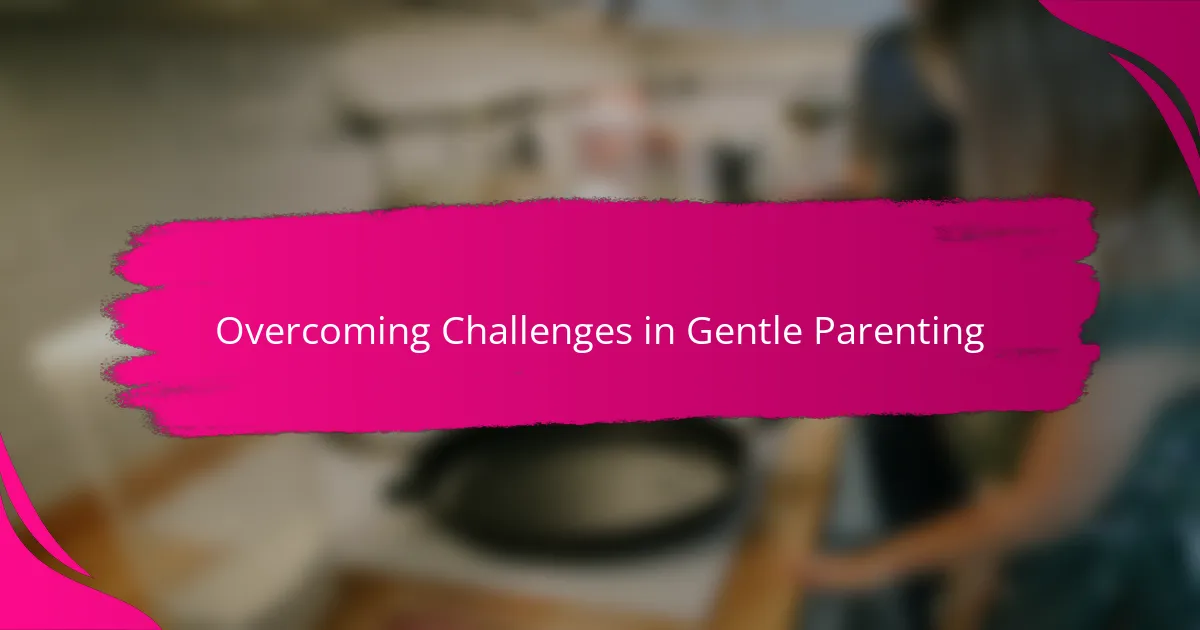
Overcoming Challenges in Gentle Parenting
Adapting gentle parenting didn’t come without its hurdles. I remember feeling overwhelmed when my child’s persistent testing of boundaries seemed to challenge my patience. Have you ever caught yourself doubting if kindness alone could guide your child? What helped me was remembering that consistency, combined with empathy, slowly builds understanding—even when it feels tough in the moment.
There were times I struggled to manage my own emotions before responding calmly. I realized that gentle parenting isn’t about being perfect; it’s about showing up with intention, even on hard days. Taking a brief pause to breathe before reacting became my secret weapon—transforming potential conflicts into chances for connection. It taught me that self-regulation is as much a part of this journey as teaching my child.
Sometimes, I felt isolated, wondering if others saw me as “too soft” or permissive. But reflecting on gentle parenting’s core values reminded me that patience and respect aren’t signs of weakness. When I shifted my focus from external judgment to the positive bond we were building, it became easier to stay the course. Have you encountered moments like these where the doubts crept in? I found that leaning on community or trusted voices can make all the difference in staying grounded.
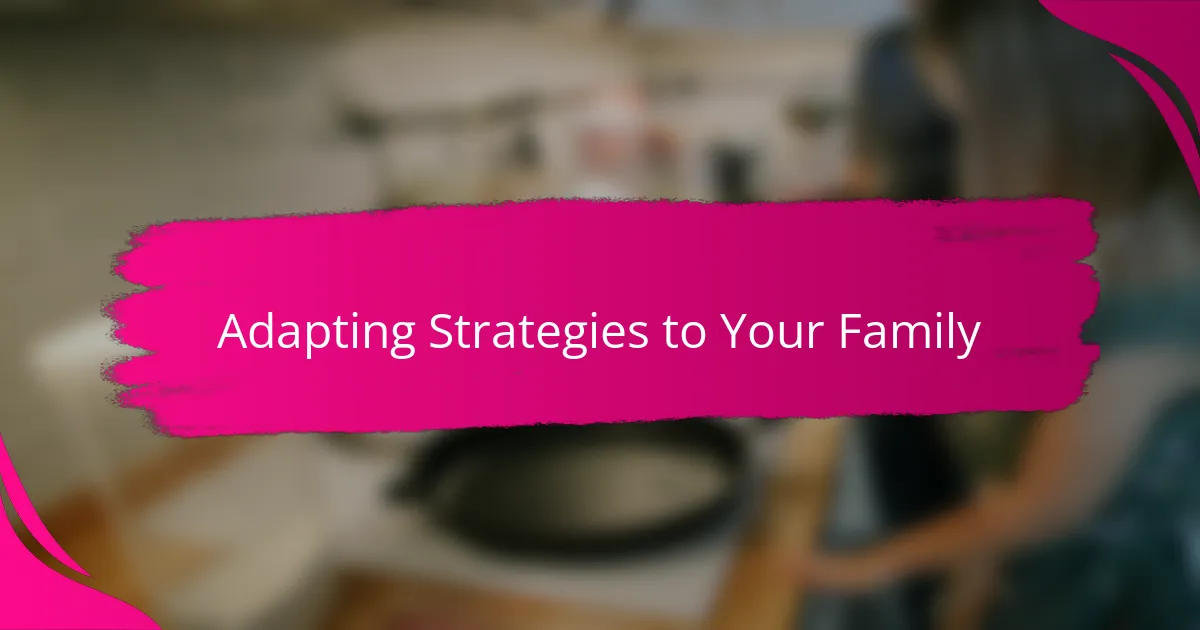
Adapting Strategies to Your Family
Adapting gentle parenting strategies to fit my family’s unique rhythm took some thoughtful trial and error. I quickly learned that what works in theory doesn’t always translate perfectly at home. For instance, while active listening felt natural during quiet moments, it required more creativity during chaotic mornings when patience ran thin.
I also discovered that each child responds differently to gentle techniques. My oldest thrived on clear explanations and choices, but my toddler needed more visual cues and gentle redirection. Have you noticed how tailoring your approach to each child’s personality can make all the difference? It taught me that flexibility, rather than rigid rules, is key in nurturing trust and cooperation.
Finally, blending gentle parenting with our family’s cultural values and daily routines felt essential. I had to embrace imperfections and allow our practices to evolve naturally. When I stopped trying to check all the “right boxes” and instead listened to what felt authentic, the whole process became less stressful and more fulfilling for everyone. How might adjusting your strategies to match your family’s rhythm transform your parenting journey?
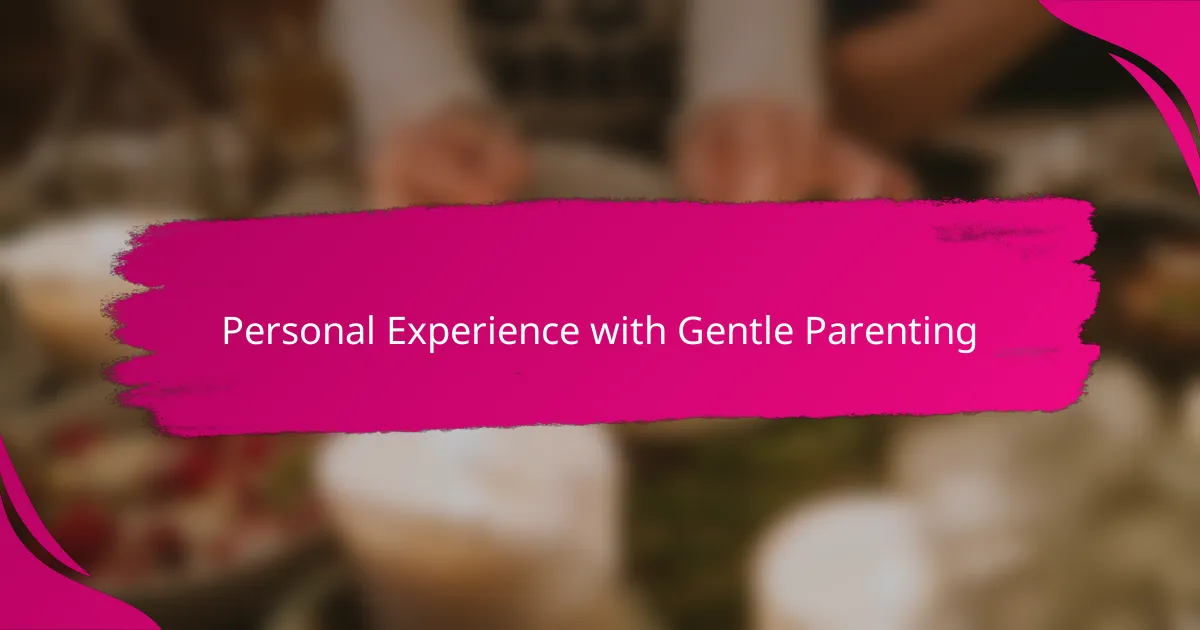
Personal Experience with Gentle Parenting
When I first embraced gentle parenting, I was surprised by how much it shifted my daily interactions. There was one afternoon when my child had a meltdown over a forgotten toy, and instead of reacting with frustration like I used to, I knelt down, listened, and simply named their feelings. That moment of connection not only calmed the storm but made me realize how powerful empathy really is.
I won’t pretend it was always smooth sailing. Sometimes, I’d wonder if I was being too lenient or if my approach was actually helping. But over time, I saw small changes—my child started to communicate more openly, and our conflicts became fewer and softer. Isn’t it incredible how a little patience and consistent kindness can nurture such growth?
One thing I’ve learned is that gentle parenting isn’t about perfection; it’s about showing up even when it’s hard. There were days I felt drained and doubted myself, yet leaning into the principles of respect and empathy kept me anchored. Have you ever noticed how the hardest moments often teach us the most? For me, those challenges deepened both my love and my understanding of my child.
